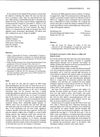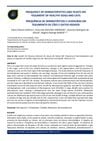 7 citations,
January 2017 in “American Journal of Biological Anthropology”
7 citations,
January 2017 in “American Journal of Biological Anthropology” Sardinians were historically short due to a mix of genetics and factors like disease and poor nutrition, but recent height increases suggest better living conditions had a bigger impact.
 6 citations,
December 2020 in “Dermatological reviews”
6 citations,
December 2020 in “Dermatological reviews” COVID-19 may worsen with androgens; anti-androgen drugs could help.
 1 citations,
April 2016 in “The American Journal of the Medical Sciences”
1 citations,
April 2016 in “The American Journal of the Medical Sciences” The document concludes that doctors should check for frontal fibrosing alopecia in patients with acquired hyperpigmentation and that early treatment is important.
 August 2009 in “Expert Review of Dermatology”
August 2009 in “Expert Review of Dermatology” Pregnancy can cause skin changes and conditions that need correct diagnosis and treatment for the health of the mother and baby.
 1514 citations,
December 2011 in “Fertility and sterility”
1514 citations,
December 2011 in “Fertility and sterility” Experts agree that PCOS affects women's health in complex ways, but more research is needed to understand and treat it effectively.
 359 citations,
September 2017 in “European Journal of Epidemiology”
359 citations,
September 2017 in “European Journal of Epidemiology” The Rotterdam Study updated findings on elderly health, focusing on heart disease, genetics, lifestyle effects, and disease understanding.
 192 citations,
January 2015 in “Journal of the American Academy of Dermatology”
192 citations,
January 2015 in “Journal of the American Academy of Dermatology” Targeted cancer therapies often cause serious skin problems that need careful management.
 65 citations,
September 2017 in “British Journal of Cancer”
65 citations,
September 2017 in “British Journal of Cancer” Black ethnicity, prior PSA tests, enlarged prostate, and family history increase prostate cancer risk; Asian ethnicity, obesity, smoking, diabetes, and less sexual activity or no children decrease risk.
 46 citations,
May 1997 in “British journal of dermatology/British journal of dermatology, Supplement”
46 citations,
May 1997 in “British journal of dermatology/British journal of dermatology, Supplement” Vitiligo is not linked to coeliac disease, but a small number of alopecia areata patients may have it, suggesting they should be tested for coeliac disease.
 31 citations,
April 2019 in “Experimental and Therapeutic Medicine”
31 citations,
April 2019 in “Experimental and Therapeutic Medicine” β-blockers can cause skin problems like psoriasis and vitiligo, and doctors should tell patients about these risks.
 29 citations,
July 2009 in “BJU international”
29 citations,
July 2009 in “BJU international” Blocking DHT production more strongly may help control advanced prostate cancer and improve quality of life.
27 citations,
January 2020 in “Acta dermatovenerologica Alpina, Pannonica et Adriatica (Tiskana izd.)” Healthcare workers in Turkey experienced more skin problems due to frequent handwashing and wearing masks and gloves during the COVID-19 outbreak.
 26 citations,
March 2014 in “Arquivos Brasileiros De Endocrinologia E Metabologia”
26 citations,
March 2014 in “Arquivos Brasileiros De Endocrinologia E Metabologia” The document concludes that proper diagnosis and combined treatments are key for hirsutism management, and weight loss may help overweight patients.
 21 citations,
April 2010 in “Molecular Medicine Reports”
21 citations,
April 2010 in “Molecular Medicine Reports” Zinc supplementation may help improve treatment outcomes for chronic hepatitis C.
 11 citations,
December 2010 in “Archives of Dermatology”
11 citations,
December 2010 in “Archives of Dermatology” A man with rare skin changes on his fingers was diagnosed with multiple myeloma-linked amyloidosis.
 10 citations,
October 2015 in “Journal of the International Association of Providers of AIDS Care”
10 citations,
October 2015 in “Journal of the International Association of Providers of AIDS Care” A woman with HIV had a severe skin condition that improved with antiretroviral therapy.
 9 citations,
December 2014 in “Neuropsychiatric Disease and Treatment”
9 citations,
December 2014 in “Neuropsychiatric Disease and Treatment” People with first-time vitiligo have lower levels of a certain brain protein compared to healthy individuals.
 8 citations,
February 2012 in “International Journal of Dermatology”
8 citations,
February 2012 in “International Journal of Dermatology” Runners often face skin problems like blisters and infections, and both prevention and early treatment are important.
 6 citations,
February 2015 in “Journal of parasitic diseases”
6 citations,
February 2015 in “Journal of parasitic diseases” Ivermectin injections and spray, along with hygiene measures, successfully treated sarcoptic mange in guinea pigs.
 4 citations,
January 2015 in “Türk Patoloji Dergisi”
4 citations,
January 2015 in “Türk Patoloji Dergisi” Hormone imbalances from endocrine diseases can cause various skin conditions that help diagnose and treat these diseases early.
 4 citations,
June 2013 in “The Journal of Rheumatology”
4 citations,
June 2013 in “The Journal of Rheumatology” The document concludes that various findings in rheumatology offer insights into disease severity, treatment responses, and potential risks in medication, with some limitations due to unspecified participant numbers.
 2 citations,
March 2005 in “Cancer biology & therapy”
2 citations,
March 2005 in “Cancer biology & therapy” Bexxar treatment led to a high response rate in patients with advanced-stage, treatment-resistant follicular lymphoma.
 2 citations,
January 2005 in “Elsevier eBooks”
2 citations,
January 2005 in “Elsevier eBooks” The document describes skin diseases affecting the outer ear in dogs and cats, their spread to other body parts, and treatment options.
 January 2024 in “Research Square (Research Square)”
January 2024 in “Research Square (Research Square)” A specially designed molybdenum oxide nanozyme can treat and monitor acute kidney injury effectively.
 June 2023 in “Deleted Journal”
June 2023 in “Deleted Journal” Healthy dogs and cats can carry and spread skin infections without showing symptoms.

The document tests knowledge and decision-making in hematology through multiple-choice questions.
 January 2005 in “Pediatric Dermatology”
January 2005 in “Pediatric Dermatology” Alopecia areata in infants may be more common than previously thought.
 418 citations,
June 2003 in “Endocrine Reviews”
418 citations,
June 2003 in “Endocrine Reviews” While PCOS might increase the risk of heart disease, there's not strong evidence to prove it causes earlier heart problems.
 336 citations,
August 2015 in “European Journal of Epidemiology”
336 citations,
August 2015 in “European Journal of Epidemiology” The Rotterdam Study found risk factors for elderly diseases, links between lifestyle and genetics with health conditions, and aimed to explore new areas like DNA methylation and sensory input effects on brain function.
 85 citations,
June 2006 in “Best Practice & Research Clinical Endocrinology & Metabolism”
85 citations,
June 2006 in “Best Practice & Research Clinical Endocrinology & Metabolism” The document concludes that hirsutism is the main sign for diagnosing hyperandrogenism, which requires a detailed patient history and physical exam.




























